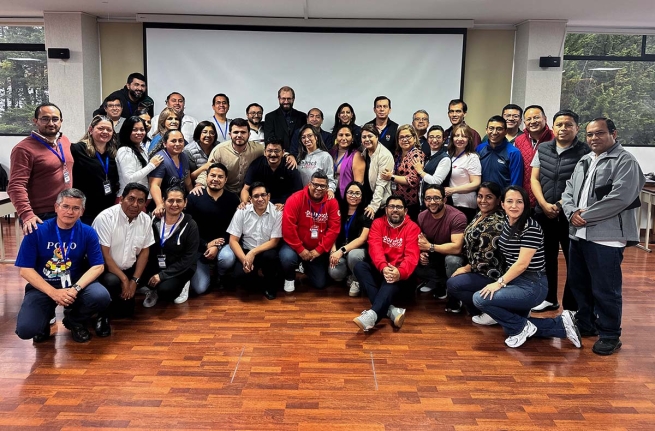For Juan Flores, responsible for the School environment: "The PES is the navigation map that guides each member of the EPC in his task of evangelising young people, inspired by the charism of Don Bosco, helping them to encounter Christ and providing them not only with tools for academic development, but also for their human and spiritual growth."
The richness of this project lies in its construction through a participatory methodology that has integrated all the members of the EPC. The proposal was validated with school teachers in formation sessions, in the assemblies of the National Council of Salesian Education (CONESA), chaired by Fr Juan Flores, together with Directors, Rectors, Vice-Rectors, representatives of other environments and, above all, with the Directory of Young Salesian Students. The next step is for local communities to know and "appropriate" the proposal.
Jannet Rosero, CONESA technician, explained that the PES was structured on the basis of key questions that led to defining the essential elements that characterise the Salesian school. "These questions are: who are we, what do we do, how do we do it, with whom do we do it?"
The document came about as a response to the objective of the Overall Province Project (OPP) in intervention 12.1: "Continuing the Salesian School Project in Ecuador, at the pedagogical-curricular, pastoral and management level, which generates an original and innovative educational brand in the country, contributing to the evangelisation of young people".
In essence, the PES seeks to consolidate the elements that characterise the educational activities of Salesian Educational Centres, presenting a proposal that integrates the Salesian pedagogical principles in Ecuador with a clear vision of evangelisation and educational excellence.
What does a school with a pastoral orientation mean?
Fr Mauricio Leime, Delegate for Youth Ministry, who led the team-based process of building the PES, frames this concept in two points:
– Clarification of key elements. "It's about clarifying elements that we sometimes forget or leave on the shelf", he says. It means continually reflecting on our mission: what does it mean today "to be signs and bearers of God's love for young people" and "good Christians and upright citizens"? This is also a reminder that the whole EPC aims to evangelise young people, allowing them to encounter Christ, without fear of this mission. This also requires that all EPC members share Salesian and Christian values, our pedagogical principles and our Preventive System.
– Something that runs across the entire EPC. Fr Leime stresses that this concept runs through all the work and mission of the EPC, becoming a charismatic option. This implies the realisation of different foundations: that young people are the key persons and the centre of the activity; the care of teachers; the existence of well-tùformed animation teams; solid institutional projects; and an educational community that accompanies them.
– This approach has a clear objective: to form highly qualified and principled students, prepared to contribute to society. Today this implies a true encounter with Christ, which translates into an education that embraces both the academic and the spiritual aspects. In every educational action, both in the classroom and in the playground, the goal is to convey these principles.
What distinguishes Salesian education?
Salesian education is characterised by a holistic approach that involves the entire educational community in its mission. This approach allows all the actors in the educational process – students, teachers and parents – to work together for the integral formation of young people. For Fr Leime, in particular, three key elements stand out:
– Youth involvement: the educational proposal starts from an EPC comprising teachers, parents and young people. At the same time, the schools have a National Directory of Students and the 21 student councils that meet regularly, which highlights the active role of young people in school life.
– Parental involvement: they are present in decision-making processes, meetings, communions, Masses, faith experiences and schools for parents.
– Qualified teachers: there is a solid formation proposal that deepens Salesian youth spirituality and the educational model. In addition, issues such as language learning and the care of our common home are integrated into the educational proposal.
"Educating by evangelising and evangelising by educating"
The PES underlines the importance of a Christian education that enables young people to achieve academic excellence, preparing them for higher education and making them active members of society. This approach also places a fundamental emphasis on technical training, which is essential for students to face life's challenges. In fact, Salesian education by its nature combines quality professional training with evangelisation, creating a space where young people can be formed in an integral way.
PES, while maintaining its raison d 'être, adapts to new challenges. Elements such as integral ecology, which the Congregation promotes, and the care of safe environments, as well as the affective education of young people, are in fact priorities. Fr Juan Flores stresses that it is necessary to "ground" this educational and pastoral proposal in Ecuador, taking into account the dynamics of change in society.
In this sense, the Salesian EPCs are called to "be bearers of a new educational style, made of welcome, family atmosphere, faith in a transcendent being that gives us salvation and, above all, trust in young people".
Marco Padilla,
Salesian Communication Office


